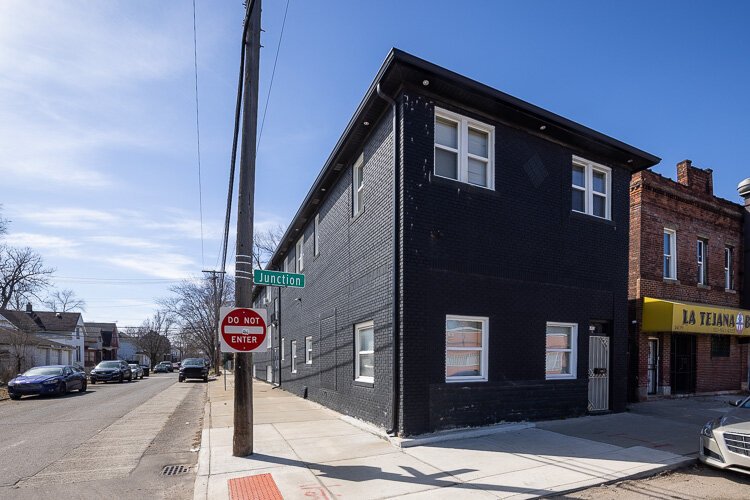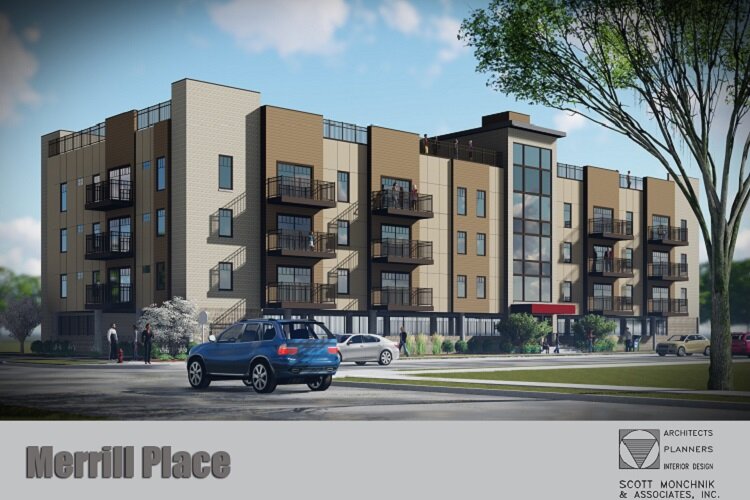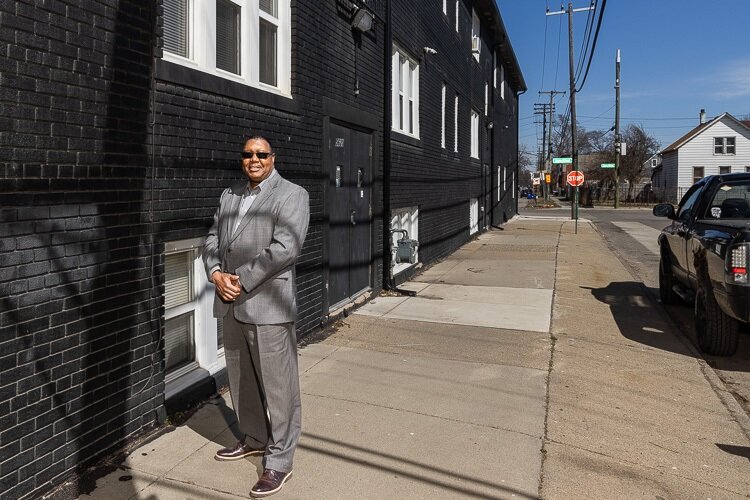Detroit projects by developers of color find support, funding in innovative initiative
This initiative has awarded $546,500 in grants to developers of color in Detroit since 2021.
Like many smaller scale developers, Bobby D. Lewis knows just getting a project off the ground can be a real ordeal.
“Those up front charges, pre-development expenses, you have to invest in vetting a project with appraisals and environmental surveys. Those are out of pocket expenses,” he says. “There is no guarantee that all the work that goes into evaluating a project means you’re going to be able to bring it to market.”
Right now, Lewis, owner of the Detroit-based real estate company Lewis Holdings Development, is in the process of renovating a 10-unit apartment complex that he purchased in Southwest Detroit. Located at 1403 Junction Ave., the building needs to be rehabbed to address maintenance issues and also requires safety upgrades and structural improvements. It’s currently occupied and before Lewis came along had been operating as what’s known as naturally occurring affordable housing, meaning its rental units are available at affordable rates, but aren’t subsidized by any federal programs.
Lewis is committed to keeping the complex affordable under his ownership; he plans to rent out 9 units at less than 50% area median income (AMI) and the building’s one two-bedroom unit at less than 120% AMI. To do this, he’s partnering with the Detroit Housing for the Future Fund (DHFF), a special fund created by the Local Initiatives Support Corporation (LISC), the City of Detroit, and the Michigan State Housing Development Authority (MSHDA) to support affordable housing development and preservation in Detroit. The combined cost of purchasing and rehabbing the Junction property will total $800,000.
A low-interest loan from DHFF and some grants from it and Detroit’s Housing and Revitalization Department are enabling Lewis to do this work and maintain the apartment complex as affordable housing. But getting to that point involved taking care of quite a bit of pre-development work. For the Junction Avenue project, this has included conducting an environmental assessment, hiring legal counsel, getting a contractor, and paying for a capital needs assessment, the commercial equivalent of a home inspection.
Fortunately, he was able to receive some help with this in the form of a grant from a nonprofit community development financial institution(CDFI) called Capital Impact Partners (CIP), which is part of the Momentus Capital family of companies. Lewis is a graduate of the Equitable Development Initiative, a development training workshop organized by CIP to support developers of color. Alumni of the program are eligible for special grants signed to help them secure pre-development services. Earlier this year, CIP awarded Lewis a $40,000 grant for this purpose, which he felt was helpful to him in sharing the risk of pursuing the project and moving forward with it once he closed the deal.
“It freed up capital,” he says. “You basically get reimbursed through the grant program, but those were scarce dollars for me and the return of my predevelopment dollars then became equity that I’m able to contribute to the overall costs of the project.”

Grants, workshops, and networks
The Equitable Development Initiative’s latest round of pre-development grants, which were awarded in January, will be distributing $415,000 to 19 graduates of the program including Lewis, all of whom are developers of color.
That funding will be used for 16 different projects and will involve developing or renovating an expected total of more than 293,000 square feet of space in Detroit and Highland Park. As a whole, these projects will encompass 262 residential units—93 of which will be available at or below 80% AMI—and 29 commercial units.
The grants, ranging from $10,000 to $75,000, are intended to help these developers like Lewis for pre-development services, which can be some of the most difficult capital for developers to raise. Funding for this work can help a developer determine whether their project is viable and less the early stage risk of pursuing a development effort.
All together, CIP has awarded a total of $546,500 in grants to developers of color in Detroit since 2021. But the Equitable Development Initiative is about much more than just providing funding for projects.
More broadly, the program is designed to help local real estate developers of color take a leadership role in shaping Detroit’s redevelopment landscape.
CIP started the initiative in Detroit five years ago. The CDFI originally began its work in Detroit more than a decade ago to support an effort called the Woodward Corridor Initiative. After that wrapped up, the nonprofit lender found itself reflecting on its path forward in Detroit.
“We took a look at our portfolio and realized we wanted to see a higher percentage of borrowers who were reflective of the city’s demographics,” says Elizabeth Luther, director of CIP’s Detroit Program. “So we took a step back and tried to think of what we could be doing to offer more real estate lending to borrowers of color.”
In an effort to remedy that situation, CIP created the Equitable Development Initiative with three goals in mind: to promote wealth-building and property ownership for real estate developers of color; to support real estate projects to help stabilize local neighborhoods; and to encourage network building in the local development community.
To achieve these goals, the CDFI launched the initiative as cohort-based training program in 2018. For the last several years, the program has provided real estate training and workshops with local development experts and city leaders to participants, as well as opportunities for discussion on opportunities and challenges facing developers of color.
Each cohort is composed of between 10-20 people who meet eligibility requirements. And CIP spent several months working to provide them with a robust training in the ins and outs of mixed use real estate development. The CDFI supplements that with mentorship, technical assistance, and capital support.
An ‘all-inclusive’ program
Lewis participated in the cohort program last year. His interest in real estate and development stretches back many years. He sees creating affordable housing as an opportunity to give back to local communities ravaged by disinvestment. Although the developer originally got his real estate license in 1987, his efforts in the industry took a back seat after he began working full-time for a local auto company. During the pandemic, however, his interest in development was reinvigorated. He heard about CIP’s program after participating in another development training program called Better Buildings, Better Blocks.
Although it took him a few applications to be accepted to EDI, Lewis believes it was worth the wait.
“It is an all-inclusive program that takes you from beginning to end in terms of what you need to do to evaluate what’s a good deal,” he says. “And it’s more than just the numbers. It’s community engagement in the area that you’re looking at [and] access to people like designers, architects, lenders, that are there in the room.”
Sauda Ahmad-Green also graduated from the EDI program. A native Detroiter and

licensed attorney, she got involved in development around the time she graduated law school in 2005. After hearing a lecture on title clearing, Ahmad-Green decided to purchase an abandoned property near where she grew up in Detroit’s Virginia Park neighborhood to get a better understanding of how the process worked.
She ended up getting a better understanding of real estate practices, but also found herself as the owner of her own property. The emerging developer cleaned up the property, got a loan, tore the old building down, and eventually built a new structure at the site, a six-unit townhomes project now known as Merrill Place I.
Realizing she had a knack for that kind of work, Ahmad-Green has continued to be active in the development field. She was introduced to EDI, through a former Capital Impact Partners executive who had worked with her on her original Merrill Place development.
Ahmad-Green, who participated in EDI’s first cohort in 2018 feels the course did a great job of filling in gaps in her development knowledge.
“It has helped me sharpen my pencil and become an even better developer. And, of course, the contacts that I’ve made and the networking has been invaluable,” she says. “I had no idea that they would have so many different cohorts after my cohort. To be honest, there wasn’t anyone else filling that need before. It’s good work and it’s really important.”
In 2021, she was awarded a $35,000 EDI pre-development grant for the second phase of her Merrill Place project. Located next door to the first structure, Merrill Place Phase Two will be a brand-new 27-unit apartment complex made up of one-and-two-bedroom apartments. The project will be a mixed income facility, with half the units being affordable at 60% AMI or below and the rest being market rate.
Ahmad-Green used her EDI grant to market studies for Merrill Place II, as well as environmental surveys and a little architectural planning. For her, the funding played an important role in getting the project ready to go.
“That money helped me continue in my pre-development efforts,” Ahmad-Green says. “Because a lot of developers spend their own money, and so most of us just go into debt. The Equitable Development grant program was invaluable in helping pay for third party reports and doing the additional things that I needed to do to get to closing.”

Investing in the future
CIP’s Equitable Development Initiative has been such a success in Detroit that the CDFI has expanded it to Dallas, Washington D.C. and the Bay area, and is planning to bring it to other Metropolitan areas.
In Detroit, five cohorts have graduated from the program since 2018. During that time the technical expertise available to participants and alumni has increased. Originally, this sort of assistance was limited to certain types of projects. But the initiative now has a small staff of in-house and third-party contractors who can help EDI-affiliated developers with general development issues or troubleshooting specific development areas.
Over the last few years, the initiative’s network of alumni and associated professionals has grown considerably as well. Alisha Moss, CEO of VM3 Consulting and Construction and an EDI graduate, founded a group called Real Estate Association of Developers to help connect alumni from the program and other developers of color in the Detroit area. CIP also makes an effort to introduce alumni to new cohort members to continually strengthen its existing network.
EDI-affiliated developers also benefit from CIP’s recent joining with the Momentus Capital family of companies, which has expanded its investment capabilities to include some small business lending in addition to community development real estate lending.
With regards to the initiative itself, Luther says there are two more years of EDI programming now in the works, and she believes there’s a good chance it may continue beyond that.
“As long as there’s demand, interest, and strategic alignment with our organization, I think we’ll continue to run this kind of capacity building program,” she says. “We’re going to be running the cohort based training this year and next year and then potentially beyond while continuing to offer resources for our alumni as well.”
Photos by David Lewinski, except where otherwise noted.
This is part of the Block by Block series, supported by FHLBank Indianapolis, that follows minority-driven development and affordable housing issues in Detroit.






